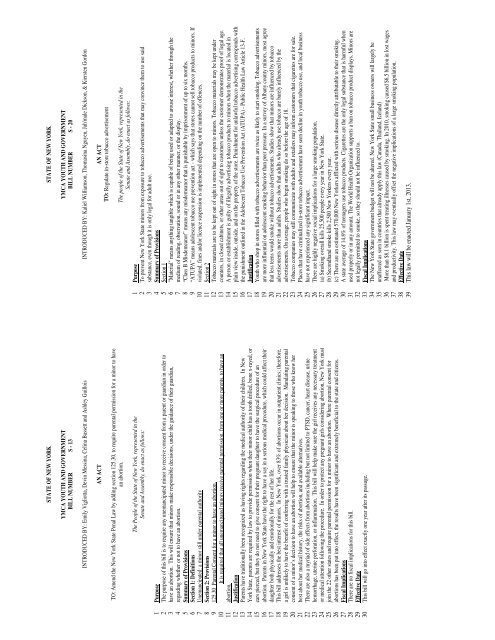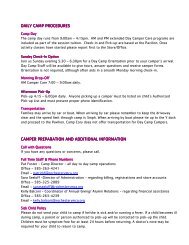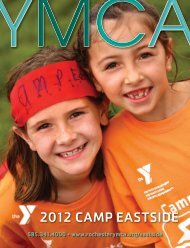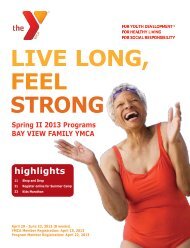2012 Conference Executive Record Report.pdf - YMCA of Greater ...
2012 Conference Executive Record Report.pdf - YMCA of Greater ...
2012 Conference Executive Record Report.pdf - YMCA of Greater ...
You also want an ePaper? Increase the reach of your titles
YUMPU automatically turns print PDFs into web optimized ePapers that Google loves.
1<br />
2<br />
3<br />
4<br />
5<br />
6<br />
7<br />
8<br />
9<br />
10<br />
11<br />
12<br />
13<br />
14<br />
15<br />
16<br />
17<br />
18<br />
19<br />
20<br />
21<br />
22<br />
23<br />
24<br />
25<br />
26<br />
27<br />
28<br />
29<br />
30<br />
STATE OF NEW YORK<br />
<strong>YMCA</strong> YOUTH AND GOVERNMENT<br />
BILL NUMBER S - 13<br />
INTRODUCED BY: Emily Vigliotta, Devin Messina, Celina Bassett and Ashley Guillois<br />
AN ACT<br />
TO: Amend the New York State Penal Law by adding section 125.30, to require parental permission for a minor to have<br />
an abortion.<br />
The People <strong>of</strong> the State <strong>of</strong> New York, represented in the<br />
Senate and Assembly, do enact as follows:<br />
Purpose<br />
The purpose <strong>of</strong> this bill is to require any unemancipated minor to receive consent from a parent or guardian in order to<br />
have an abortion. This will ensure that minors make responsible decisions, under the guidance <strong>of</strong> their guardian,<br />
regarding whether or not to have an abortion.<br />
Summary <strong>of</strong> Provisions<br />
Section 1: Definitions<br />
Unemancipated: a minor still under parental authority<br />
Section 2: Provisions<br />
125.30 Parental Consent for a minor to have an abortion.<br />
It is required that all unemancipated minors receive parental permission, from one or more parents, to have an<br />
abortion.<br />
Justification<br />
Parents have traditionally been recognized as having rights regarding the medical authority <strong>of</strong> their children. In New<br />
York State, parents are required by law to provide permission when their minor child has a tooth drilled, bone x-rayed, or<br />
ears pierced, but they do not need to give consent for their pregnant daughter to have the surgical procedure <strong>of</strong> an<br />
abortion. Parents in New York State have the right to have a say in a serious medical procedure, which could affect their<br />
daughter both physically and emotionally for the rest <strong>of</strong> her life.<br />
This bill addresses the best interest <strong>of</strong> minors. In New York, over 83% <strong>of</strong> abortions occur in outpatient clinics; therefore,<br />
a girl is unlikely to have the benefit <strong>of</strong> conferring with a trusted family physician about her decision. Mandating parental<br />
consent <strong>of</strong> a minor’s decision to have an abortion will help to ensure that the minor is speaking to those who know her<br />
best about her medical history, the risks <strong>of</strong> abortion, and available alternatives.<br />
There are also a myriad <strong>of</strong> side effects from abortions including but not limited to PTSD, cancer, heart disease, urine<br />
hemorrhage, uterine perforation, or inflammation. This bill will help make sure the girl receives any necessary treatment<br />
or medical attention following the procedure. In order to protect any pregnant girls considering abortion, New York must<br />
join the 22 other states and require parental permission for a minor to have an abortion. Where parental consent for<br />
abortions has been put into effect, the results have been significant and extremely beneficial to the state and citizens.<br />
Fiscal Implications<br />
There are no fiscal implications for this bill.<br />
Effective Date<br />
This bill will go into effect exactly one year after its passage.<br />
1<br />
2<br />
3<br />
4<br />
5<br />
6<br />
7<br />
8<br />
9<br />
10<br />
11<br />
12<br />
13<br />
14<br />
15<br />
16<br />
17<br />
18<br />
19<br />
20<br />
21<br />
22<br />
23<br />
24<br />
25<br />
26<br />
27<br />
28<br />
29<br />
30<br />
31<br />
32<br />
33<br />
34<br />
35<br />
36<br />
37<br />
38<br />
39<br />
STATE OF NEW YORK<br />
<strong>YMCA</strong> YOUTH AND GOVERNMENT<br />
BILL NUMBER S - 20<br />
INTRODUCED BY: Kaliel Williamson, Thomasina Nguyen, Jah'male Dickson, & Kiersten Gordon<br />
AN ACT<br />
TO: Regulate in-store tobacco advertisement<br />
The people <strong>of</strong> the State <strong>of</strong> New York, represented in the<br />
Senate and Assembly, do enact as follows:<br />
Purpose<br />
To prevent New York State minors from exposure to tobacco advertisements that may convince them to use said<br />
substance, even though it is only legal for adult use.<br />
Summary <strong>of</strong> Provisions<br />
Section 1<br />
"Material" means anything tangible which is capable <strong>of</strong> being used or adapted to arouse interest, whether through the<br />
medium <strong>of</strong> reading, observation, sound or in any other manner, or the display.<br />
“Class B Misdemeanor” means any misdemeanor that is punishable by imprisonment <strong>of</strong> up to six months.<br />
“ATUPA” means adolescent tobacco use prevention act - which says that stores cannot sell tobacco products to minors. If<br />
violated, fines and/or licence suspension is implemented depending on the number <strong>of</strong> <strong>of</strong>fences.<br />
Section 2<br />
Tobacco materials are to be kept out <strong>of</strong> sight in stores that are open to minors. Tobacco materials may be kept under<br />
counters, in closed cabinets, or other areas out <strong>of</strong> sight to customers unless the customer demonstrates pro<strong>of</strong> <strong>of</strong> legal age.<br />
A person or establishment is guilty <strong>of</strong> illegally advertising tobacco products to minors when the material is located in<br />
plain view inside, outside, and on the property <strong>of</strong> the store. Punishment for unlawful tobacco advertising corresponds with<br />
the punishment outlined in the Adolescent Tobacco Use Prevention Act (ATUPA) - Public Health Law Article 13-F.<br />
Justification<br />
Youth who shop in stores filled with tobacco advertisements are twice as likely to start smoking. Tobacco advertisements<br />
are more influential on adolescent smoking behavior than peer pressure. In a survey <strong>of</strong> Albany county minors, most agree<br />
that less teens would smoke without tobacco advertisements. Studies show that minors are influenced by tobacco<br />
advertisements more than adults. Studies show that adults who already use tobacco are barely influenced by the<br />
advertisements. On average, people who begin smoking do so before the age <strong>of</strong> 18.<br />
Tobacco companies may still communicate with adults and retailers may inform customers that cigarettes are for sale.<br />
Places that have criminalized in-store tobacco advertisement have seen decline in youth tobacco use, and local business<br />
have not experienced any significant impact.<br />
There are highly negative social implications for a large smoking population.<br />
(a) Smoking overall kills 25,500 people every year in New York State.<br />
(b) Secondhand smoke kills 2,500 New Yorkers every year.<br />
(c) There are an estimated 570,000 New Yorkers afflicted with serious disease directly attributable to their smoking.<br />
A state average <strong>of</strong> 14.8% <strong>of</strong> teenagers use tobacco products. Cigarettes are the only legal substance that is harmful when<br />
used properly or in any amount. The World Health Organization supports a ban on tobacco product displays. Minors are<br />
not legally permitted to smoke, so they should not be influenced to.<br />
Fiscal Implications<br />
The New York State government budget will not be altered. New York State small business owners will largely be<br />
unaffected as seen in countries that already apply this law (Canada, Thailand, Iceland)<br />
More than $8.1 billion is spent treating illnesses caused by smoking. In 2010, smoking caused $6.5 billion in lost wages<br />
and productivity. This law may eventually <strong>of</strong>fset the negative implications <strong>of</strong> a large smoking population.<br />
Effective Date<br />
This law will be enacted January 1st, 2013.
















